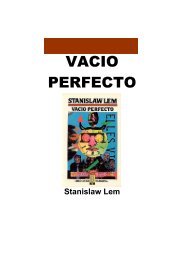cambridge-crime-fiction
cambridge-crime-fiction
cambridge-crime-fiction
Create successful ePaper yourself
Turn your PDF publications into a flip-book with our unique Google optimized e-Paper software.
laura marcus<br />
chess and crossword puzzles, arguing that the pleasures of the detective novel<br />
were, for the modern reader, almost entirely ‘ratiocinative’. The concept of<br />
‘fair play’ in the construction of detective narratives suggested an ethical<br />
dimension, but was rather more important as a way of emphasising the<br />
ludic aspects of the genre, central to the theories of writers on detective<br />
<strong>fiction</strong> such as Roger Caillois, whose work has had a significant influence<br />
on postmodern theory. Caillois was fascinated by the role of games and<br />
play in culture and, as Jorge Luis Borges noted in his review of Caillois’s<br />
Le Roman policier, analysed the role of detective <strong>fiction</strong> as ‘rational game,<br />
lucid game’. 69 More generally, detective <strong>fiction</strong>, as Dennis Porter has argued,<br />
constructs an ‘ambience of play’ in the form of the ‘surprise of <strong>crime</strong>’, which<br />
emerges in, for example, the use of the most unlikely suspect and the most<br />
improbable detective figure, the classic example of whom is Agatha Christie’s<br />
Miss Marple. 70<br />
Detective <strong>fiction</strong> was of central interest to the Oulipo, (Ouvroir de<br />
Literature Potentielle), founded by the experimental writers Raymond<br />
Queneau and François Le Lionnais in 1960 to explore the ways in which<br />
abstract restrictions could be combined with imaginative writing (as in<br />
George Perec’s novel La Disparition (1969), written without the letter e).<br />
In 1973, LeLionnais inaugurated the Oulipopo (Ouvroir de Litterature<br />
Policière Potentielle); its first projects were analyses ‘dissecting many known<br />
or possible combinations concerning situation and character in the mystery<br />
story’ (Analytic Oulipopo), proceeding to ways ‘to discover, distinguish, or<br />
invent procedures or constraints that could serve as “aids to imagination” of<br />
writers of detective stories’ (Synthetic Oulipopo). 71 Oulipopian experiments<br />
included ‘Haikuisation’ – ‘A version of the Oulipian procedure whereby the<br />
first and last sentences or phrases of a detective novel are alone retained,<br />
these being traditionally the most significant in works of this genre’ – and<br />
the writing of a detective novel in which the reader is guilty. The Oulipopo<br />
group were fascinated by the construction of rules for composing detective<br />
<strong>fiction</strong>, particularly those of S. S. Van Dine and Ronald Knox, turning<br />
these early twentieth-century attempts to define the conventions and limits<br />
of the detective genre into literary games that combined surrealism and<br />
structuralism. George Perec’s final novel 53 Days (2000), unfinished at his<br />
death and completed from his notes by Oulipians Harry Matthews and<br />
Jacques Roubaud, is a ‘literary thriller’ which inscribes, among other texts,<br />
Stendhal’s The Charterhouse of Parma (the 53 days of Perec’s title refers to<br />
the time taken by Stendhal to dictate his novel), Agatha Christie’s And Then<br />
There Were None (1939) inwhich, in Perec’s words, ‘nine unconvicted culprits<br />
are executed . . . by a judge who makes it seem as if he is the tenth<br />
(but not the last) victim’, and a short story by the <strong>crime</strong> writer Maurice<br />
262



